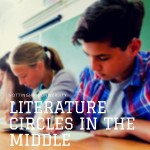We have a seven hour day at my school. All in all I’d say my second/third grade students spend about four of those hours in some type of reading, whether it be science, geography, social studies, math or directed reading groups.
We all know that outside reading is a significant part of growth for the beginning reader. But when students spend a majority of their day reading in class, how can you motivate them to read outside of class time? Couple that with busy parents who want to believe that additional reading is not as necessary since we read a ton in class and skills can be lost before they become solid.
In my class I am big on goal setting and student-teacher conferences, even with my little ones. I feel that teaching students that they are ‘the boss’ of everything in their lives, including their learning opens up a whole new perspective to them. Second and third graders are naturally bossy, so I use this to my advantage instead of it being something negative. They are the bosses of their words, hands, actions, desk, mailbox, coat hook, so why not all aspects of their learning?
This approach has taken the burden off of me of being the ‘nagging’ teacher, because they love to tell their grown-ups that they are in charge of their nightly reading and that they must be responsible ‘bosses’.
Now to get the parents on board.
Three things that I do every week that improves parent involvement:
1. At the beginning of the year, I set a challenge out to my class at parent orientation that for 100 books read, the kids get a trophy at our end of the year awards program. The kids also know from previous exposure that I hand out additional reading awards, and they are GOOD awards, not just trophies.
2. The next thing I do is provide appropriate books to parents. Remember, teachers went to school to teach. We know what our kids need to be reading. The leveled books that parents can find in the bookstores or online do not necessarily meet the guidelines that we want our students to be following. Just because a book says its an ‘easy reader’ does not always make it an easy read for a struggling first grader. Reading is all about confidence and success. I send home baggy books that are on each students’ reading level. The bags contain anywhere from one to five books that the kids can read and write down on their book list. This way parents have books that they know are appropriate for their child’s reading level.
3. The final step is communication. Are the parents following through with what I’ve instructed? Are the kids taking responsibility for the items I am sending home? Remember, these little jewels we have in class LOVE to let everyone know what is going on when they are not in school. Put that skill to good use and take inventory of what is and what is not getting done during those off hours. I ask for a raise of hands of who read their baggy books last night. I then ask for a raise of hands of who read any type of book last night. Believe me, you get a pretty honest answer from your students. This allows me to either speak with the parents face to face or write a note home reminding them what they need to do.
How do you encourage the school-to-home link?




